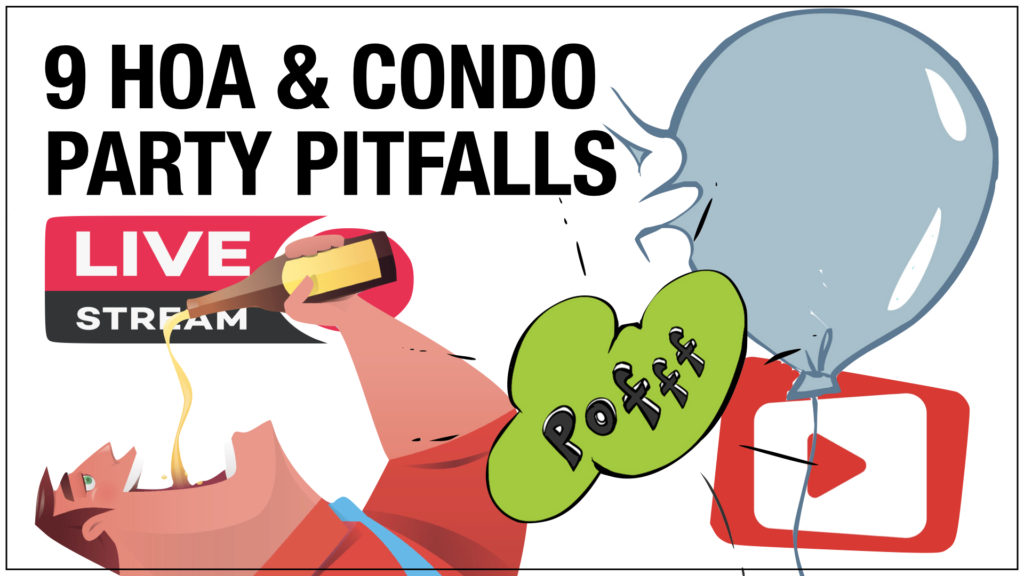
NATIONAL:
According to a recent AssociationHelpNow® livestream audience poll, 60% of participants said they get more compliments than complaints regarding social events they’ve held. However, managers, boards and committee members should be aware of some pitfalls these events present.We asked a panel of professionals who work with community associations about some of the more common events, and what to watch out for. Here’s what came up:
1. Movie Nights:
For the most part, these are fun and easy events which don’t present much risk from an insurance standpoint, according to Gregg Gerelli, of Gerelli Insurance in Cold Spring New York. However, associations should be careful not to break any copyright laws. For example, if you’re charging a huge crowd of people to watch a Disney movie — or any movie for that matter — you’re technically violating the copyrights of that media. “It’s not just movies, if you’re piping in music, there’s even music rights. You have to get permission to utilize that,” said attorney John LaGumina of The LaGumina Law Firm, PLLC in Purchase, New York.
2. Holiday Parties:
“Under the Business Judgement Rule, New York courts aren’t going to look at what you do — but the exception to that is discrimination. Treating some peoples’ holidays different than other peoples’ holidays — that might open that up.”
3. Events with Alcohol:
Another potential issue with many types of parties is that many people like to bring alcohol. This opens up a slew of other issues.
“Most insurance policies will have host liquor liability coverage,” said Gerelli. That would be for situations where a bottle of wine is out, for example, no one is charging for it, and people help themselves. If something were to happen in this case, according to Gerelli, you would be covered by your insurance policy. “The extreme opposite is that is you’re holding a holiday party, and you have a bar set up and you’re charging $5 for a beer. They need to have a liquor license and liquor liability insurance, because now you’re in the business of selling liquor,” he said. Gerelli suggests keeping your activities within what is covered by the host liquor liability policy. He also said that associations should check to see if whatever type of event they’re having is even covered by the master policy of the association. “There are special event policies that you can purchase to make sure that your event is covered, and also keep any claim coming from that event off the loss history of your master policy and onto the special event policy,” he said.
“Once there’s liquor, there are a lot of risks and liabilities,” said LaGumina. “There are dram shop laws, they impose liability if you’re the one letting someone drink on your premises.”
4. Halloween Costume Parties:
Aside from the items mentioned above, these parties would be viewed as nothing that would be outside of the normal scope of what an association would do, according to Gerelli. However, there still could be some scary risks. “Food poisoning is one that could come out of the candy being given out, there’s trips and falls, and hazards and smoke and strobe lights. Any time you do one of these events you’re opening yourself up to a little more exposure,” he said.
Another risk to watch out for, as pointed out by Tyler Carlyon, a manager with Spinnaker Management in Wallkill, New York, is indecent costumes, especially if children will be present. You could also have offensive costumes that could potentially lead to discrimination complaints.
5. Competitions or Sporting Events:
Insurance policies typically cover what associations would normally be doing. However, when you get into association events such as tackle football, or axe throwing, according to Gerelli, these events could pose a problem. “There could be sports exclusions — they’re going to be hunting for exclusions if someone gets injured in an axe throwing event,” he said. “That’s where you want to look into the special events policies, for the sporting event, the axe throwing, race or whatever that competition might be. Talk to your agent and make sure there are no holes in the insurance coverage.”.
6. Pot Luck and Dessert Parties:
These are pretty standard as far as the associations go, however, food poisoning can be an issue here as well. “It would depend on size and attendance,” said Gerelli, “but that’s where, if you’re having a large pot luck and dessert party, that is where a food poisoning claim could come in and you’d be better off having a special event policy than not having it.”
Additionally, Carlyon noted that you should be careful of open flames on the food heating elements at buffets.
Allergies could be another issue here. “The board didn’t make the food so they didn’t know what’s in it, but it could end up being a D&O claim for how it was handled and who ordered it. And a bodily injury claim for the person who got injured,” said LaGumina.
7. Poker & Bingo Nights:
These events involve money and gambling and typically require licenses from municipalities or state governments. Carlyon recommends not using money and having different types of rewards. “Definitely if it involves alcohol,” said LaGumina, “that’s a no-no, and if it involves money, that’s even worse.”
8. Karaoke Parties:
Again, copyright is the big issue here. “Using music, you have to get the music royalty rights,” said LaGumina.
9. Pool Parties:
Gerelli recommends getting a special event policy if you’re going to have a lot of people come to the pool party.
Another general note — if you get outside services for your party, such as servers or entertainers, Gerelli recommends getting their insurance policy, thereby transferring the risk to that vendor coming in. “But you want to make sure that vendor has the right insurance,” he said.
•••
Carlyon noted the important points for managers and boards when organizing community events are, “communication, making sure you’re not breaking any laws, making sure you’re insured and giving everyone ample notice so they have a fair chance to attend,” he said.
From the insurance perspective, “transfer the risk to a vendor or a special events policy, so in the event something happens, it’s not as big of a problem,” said Gerelli.
Written by AHN Staff



